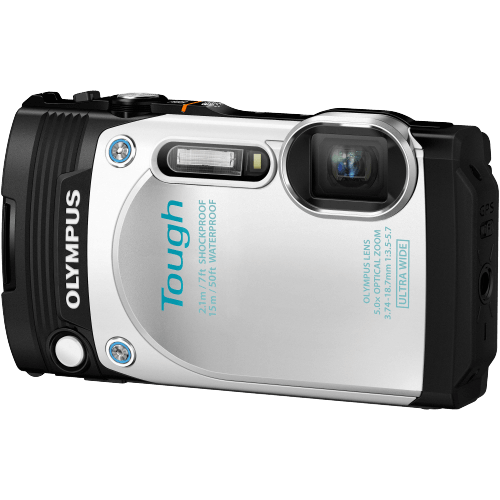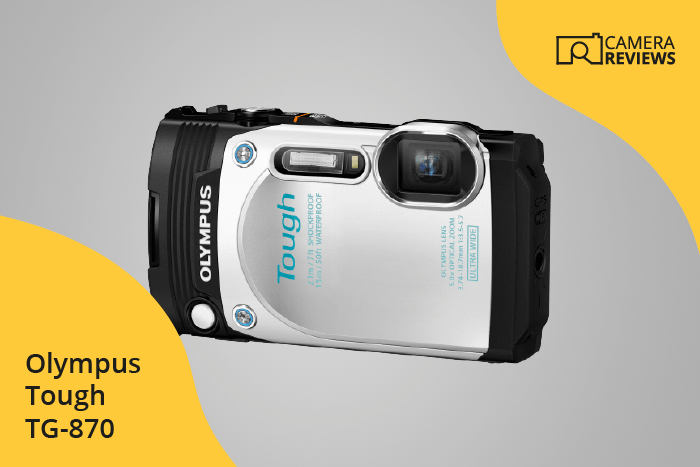Olympus Tough TG-870 Specs and Scores

The Olympus Tough TG-870 scores a 51/100 in our evaluation. Announced on January 6, 2016, this compact camera entered the market at a launch price of $279. The TG-870 measures 113 x 64 x 28mm and weighs 221g or 0.49lbs. Despite its age, the camera’s specifications still hold up decently in today’s market. Although not groundbreaking, the TG-870 offers a solid option for those seeking a compact and lightweight camera.
Olympus Tough TG-870 Overview and Optics
The Olympus Tough TG-870 receives a score of 53/100 for its optics. This camera has 16 megapixels, a shooting speed of 7, a CMOS sensor, and a TruePic VII processor. The DXOMARK score for the sensor is 74, and the sensor size is 1/2.3″. The camera uses a fixed lens mount, making lens changes impossible. However, image stabilization is available, and the aspect ratio is 4:3.
In the current market, the TG-870’s optics specifications may not be highly competitive. Many cameras now offer higher megapixel counts and faster shooting speeds. The fixed lens mount may limit versatility for some users. Despite these limitations, the image stabilization feature and 4:3 aspect ratio are valuable assets for certain shooting situations.
The Olympus Tough TG-870 is a capable camera with decent optics, but it may not be the top choice for those seeking the latest technology in the market. Its specifications are suitable for casual photography, but professional photographers might look for more advanced options.
Olympus Tough TG-870 Video Performance
The Olympus Tough TG-870 achieves a video score of 70 out of 100. This camera offers Full HD video resolution with maximum dimensions of 1920 x 1080. It also supports a maximum video frame rate of 60fps, ensuring smooth and clear recordings. Additionally, the built-in time-lapse functionality allows for creative videography options.
Comparing these specifications to other cameras in today’s market, the TG-870 delivers acceptable video performance; however, it might not satisfy those seeking 4K resolution or higher frame rates. Nevertheless, this camera remains a solid choice for casual users who prioritize durability and versatility over cutting-edge video features.
Considering its video capabilities, the Olympus Tough TG-870 provides reliable performance for most users, while also offering unique features such as time-lapse functionality. While it may not be the top choice for professional videographers, it serves as a practical option for those seeking a rugged and versatile camera.
Olympus Tough TG-870 Features and Benefits
The Olympus Tough TG-870 achieves a feature score of 54/100, which reflects its moderate range of functionalities. The camera offers a 3-inch screen with a resolution of 921,000 dots, providing clear image preview and review. However, the TG-870 lacks a touchscreen, which is a standard feature in many modern cameras.
One notable feature is the flip screen, allowing for versatile shooting angles and convenient self-portraits. The camera also includes GPS functionality, enabling geotagging of photos and location tracking. Additionally, the TG-870 supports WIFI connectivity for easy sharing and remote control, but it does not offer Bluetooth capabilities.
Considering these specifications, the Olympus Tough TG-870 holds its own in terms of features but may not be the top choice for advanced users seeking the latest technology in their cameras.
Olympus Tough TG-870 Storage and Battery
The Olympus Tough TG-870 receives a storage and battery score of 16/100. This camera has a single memory card slot, supporting SD, SDHC, and SDXC cards for storage. Although this is standard for many cameras, it may not be sufficient for those who require multiple card slots.
The battery life of the TG-870 allows for 300 shots, which is significantly less than many modern cameras. The battery type is Li-50B, and it lacks USB charging capabilities. This camera’s storage and battery specifications are not impressive compared to current market standards. However, the TG-870 may still be suitable for casual users who do not prioritize these features.
Olympus Tough TG-870 Alternatives
Do you want to know how the Olympus Tough TG-870 compares to its competitors? Have a look at the most popular comparisons for this camera below:
Olympus Tough TG-870 FAQ
Does the Olympus Tough TG-870 Have Built-in Image Stabilization?
Yes, the Olympus Tough TG-870 features built-in image stabilization, which helps reduce camera shake and improve image sharpness in various shooting conditions.
Does the Olympus Tough TG-870 Support 4K Video Recording?
No, the Olympus Tough TG-870 does not support 4K video recording. It can record videos at a maximum resolution of Full HD (1920×1080) at 60fps.
What Size Sensor Does The Olympus Tough TG-870 Have?
The Olympus Tough TG-870 is equipped with a 1/2.3″ CMOS sensor, which is a common size for compact cameras and provides good image quality in various lighting conditions.
Does the Olympus Tough TG-870 Have a Dual Memory Card Slot?
No, the Olympus Tough TG-870 does not have a dual memory card slot. It has a single SD/SDHC/SDXC card slot for storage.
Does the Olympus Tough TG-870 Have a Touch Screen?
No, the Olympus Tough TG-870 does not have a touch screen. However, it features a 3.0-inch tilting LCD screen for easy framing and viewing of images.
Does the Olympus Tough TG-870 Have Wi-Fi and Bluetooth?
The Olympus Tough TG-870 has built-in Wi-Fi for wireless image transfer and remote control, but it does not have Bluetooth connectivity.
Does the Olympus Tough TG-870 Have GPS?
Yes, the Olympus Tough TG-870 includes a built-in GPS feature, allowing you to geotag your images and track your adventures.
Is the Olympus Tough TG-870 Weather Sealed?
Yes, the Olympus Tough TG-870 is weather sealed, offering protection against water, dust, and freezing temperatures, making it suitable for outdoor and adventure photography.
Does the Olympus Tough TG-870 Have a Built-in Flash?
Yes, the Olympus Tough TG-870 has a built-in flash, which helps to illuminate your subjects in low-light situations.

